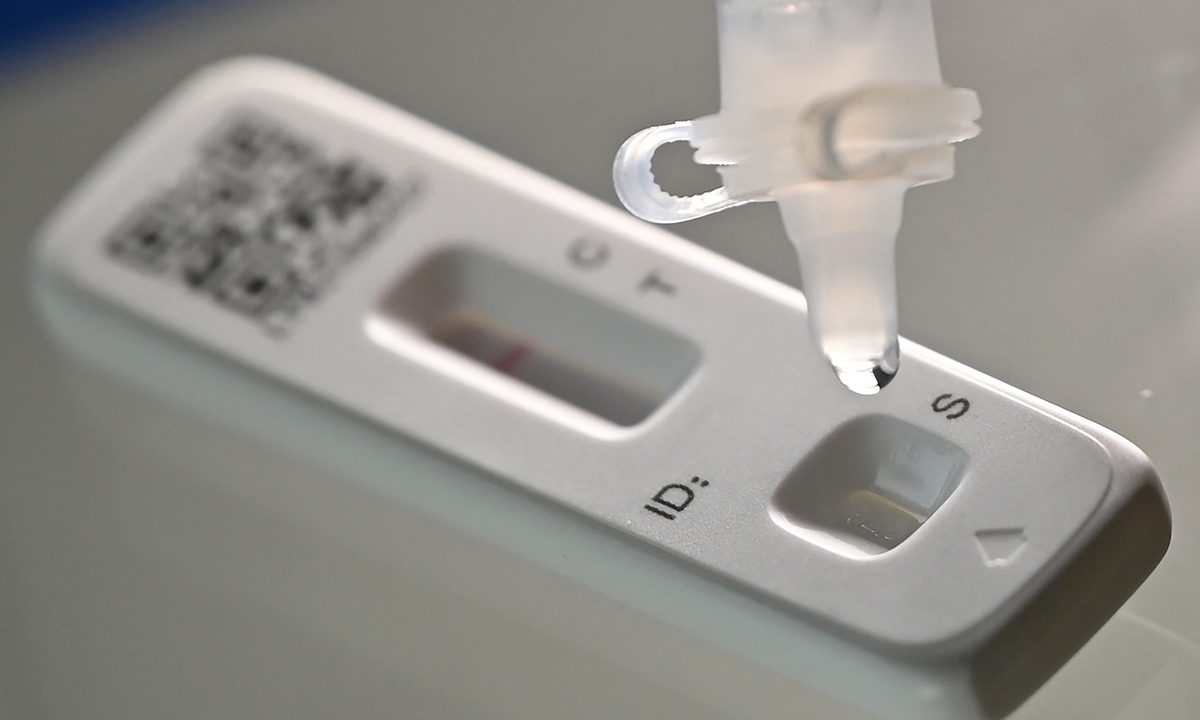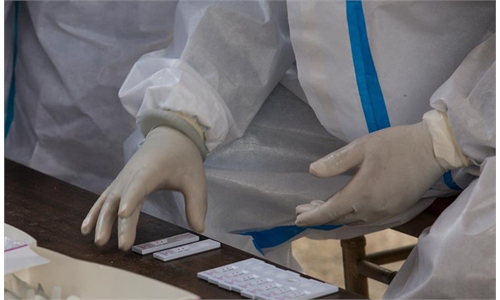
Antigen detection product Photo: VCG
A number of pharmacies across China have begun to stock their shelves with COVID-19 antigen detection products, which give faster testing results than nucleic acid testing, right after the state's drug authorities cleared such products for the domestic market on Friday and as a new wave of cases hit China.
Several leading chain store pharmacies announced over the weekend that they had entered into agreements with Guangzhou-based coronavirus test kit maker Wondfo Biotech Co, a leading manufacturer of COVID-19 antigen detection products, for the sale and distribution of the products. However, it seems that the products will need a few days' time to arrive at physical stores.
A staffer with Guangzhou-based Dashenlin, a pharmacy chain that covers 16 provinces in southern and eastern China with 7,600 stores, confirmed to the Global Times on Sunday that its physical stores are stocking the antigen detection products. However, stocks were not available as of press time on Sunday.
A staff member at LBX Pharmacy in Shanghai told the Global Times on Sunday that the stores received a notice to sell COVID-19 antigen kits on Saturday, and the first batch of products will hit the market as early as Wednesday.
"A box with 20 kits will be priced at less than 600 yuan ($94.64). There will be no restrictions on purchases," the staff member said.
Chinese delivery giant Meituan also began pre-sales of the products on its site, and it said that delivery would begin on March 20 for pre-orders. The platform also teamed up with a number of chain stores to provide 30-minute delivery services within the week, Meituan said in a statement sent to the Global Times on Sunday.
On Friday, the National Health Commission announced that the general public will be able to use rapid antigen testing, a move it believed will be helpful in identifying COVID-19 cases sooner as the country has decided to promote monitoring by using both "antigen screening and nucleic acid diagnosis."
In a trial protocol announced on the same day, it stated that the groups who can use antigen testing include those who need to go to hospitals with symptoms such as respiratory tract infections or fevers, as well as people who are under quarantine observation. The products can be purchased at citizens' own accord and at pharmacies, online sales platforms and other channels.
As the antigen test product can yield a result in about 15 minutes and does not require professionals or special equipment, it is viewed as having potential. On a single test basis, the antigen test is cheaper than a nucleic acid testing, but multiple tests are suggested by experts to ensure accuracy.
A report by Zhongtai Securities Co estimated the market demand of antigen detection products may swell to the range of 212.4-319.2 billion yuan a year measured by annual sales.
The Chinese mainland reported more than 1,800 locally transmitted COVID-19 infections on Saturday, including local asymptomatic infections.
The National Medical Products Administration on Saturday approved five COVID-19 antigen self-testing products for sale, which will be used as a supplement to the standard nucleic acid testing to help fight the spread of the virus.
In addition to Wondfo, products made by Vazyme Biotech in Nanjing and Jinwofu Bioengineering Tech in Beijing were also among the approved items, according to China Central Television.
A sales manager with Beijing Jinwofu Bioengineering Technology Co said the company's daily output, now being ramped up to 1.7 million units per day for the domestic market, is being prioritized for Northeast China's Jilin Province and "demand far outstrips supply."
In Jilin, where case numbers have increased rapidly, a resident told the Global Times that the test kits might be handed out to those in need by the government as current community lockdowns to prevent purchases at physical stores.
On Meituan, test kits made by Jinwofu cost 32.8 yuan per unit.
Industry insiders said that the antigen tests can be conducted by those in need at home, and they could meet the needs of grass-roots medical institutions that lack sufficient nucleic acid testing capacity.
Compared with nucleic acid testing, the antigen testing kits are much cheaper and more convenient. The results of antigen testing also have a strong value, even though the kits are less sensitive than nucleic acid testing, said Zhang Wenhong, head of the Center for Infectious Diseases with the Shanghai-based Huashan Hospital of Fudan University, in an interview with Shanghai Media Group on Friday.
Experts said that amid the recent spread of the Omicron variant, antigen self-testing products could help shore up the nation's prevention capacity against the possible larger scale of imported cases when the international community further reduces restrictions and China gradually opens up in the future.


